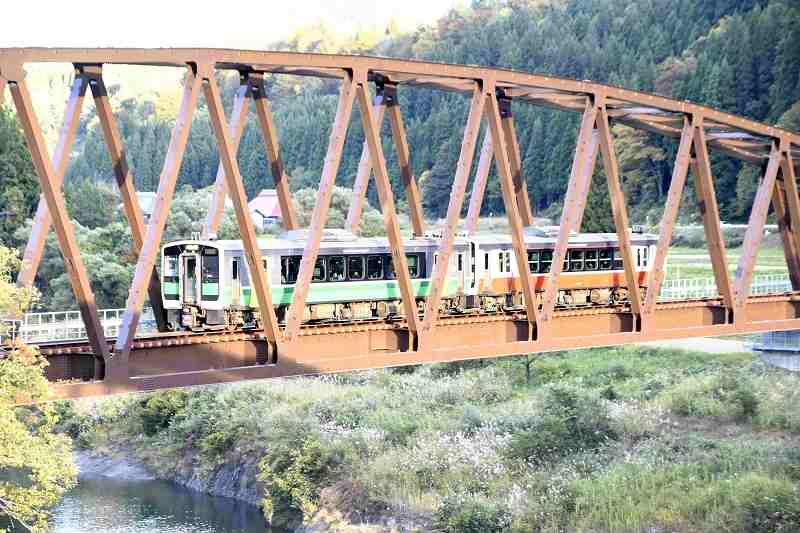
A train is seen on JR East’s Tadami Line on Oct. 26.
12:44 JST, November 30, 2022
TOKYO (Jiji Press) — With Japanese railway operators facing tough business conditions due to population declines and the COVID-19 pandemic, talks on what to do with unprofitable regional lines across the country are becoming inevitable.
Whether the operators and others can present visions for the future from the perspective of users will be key to the success of such talks, as many people living near loss-making train lines are strongly concerned about their possible scrapping, pundits say.
In early October, East Japan Railway Co., or JR East, resumed full operations of its Tadami Line, which links Niigata and Fukushima prefectures, with a section that had been closed due to heavy damage from torrential rains in 2011 brought back online.
The line avoided closure thanks to the adoption of a scheme in which local governments own and manage facilities such as railway tracks while railway firms operate train services.
Under the split-management system, railway operators can avoid booking depreciation and other costs, and may see their earnings improve if local governments reduce fees for their use of the infrastructure or exempt them from the payments.
It is the first time that JR East has utilized the system, which is still rare in Japan.
“It is important that we produce solid results,” JR East President Yuji Fukasawa said, showing his expectations that the use of the split-management system for the Tadami Line will become a good model for other regions.
In a set of proposals drawn up in July, an experts panel under the transport ministry urged the central and local governments and railway operators to speed up talks on the fate of unprofitable regional train lines, citing the split-management system as an option.
The ministry plans to give subsidies to and reduce tax burdens for local governments that adopt the system as a way to promote the scheme.
But hurdles lie ahead. While the Tadami Line can expect certain demand, including from railway fans who adore it for running through secluded regions, other struggling train lines in the countryside may not be able to draw many visitors. There is also the issue of high costs for local governments.
“The challenge will be to gain the understanding of locals other than train users and those outside the tourism industry,” said Kai Kawate, senior consultant at Nomura Research Institute Ltd.
Another option for struggling train lines is to convert them to bus services.
Attracting attention, for example, is the so-called bus rapid transit, or BRT, system, in which rail tracks are converted to specialized roads for buses. It enables operators to both cut expenses and offer services that meet the needs.
In addition, the specialized roads make the introduction of autonomous driving technology easier. In December, JR East is set to start offering self-driving bus services for part of the BRT system for its Kesennuma Line in Miyagi Prefecture.
According to an NRI survey of some 10,000 people living near regional train lines run by JR East and West Japan Railway Co., or JR West, 75% said that they almost never use the lines.
At the same time, 52% answered that such lines are “spiritual support for local residents.” The result suggests that there are high psychological barriers to scrapping railways with symbolic importance for local communities even if they are running losses.
“There is a need for parties involved to explain [to local people concerned] that the talks on loss-making railways are forward-looking discussions for rebuilding transport networks from the perspective of users,” said Kawate.
Also key to the reviews will be developing systems to provide integrated mobility services by linking multiple public transport systems with information technology, and ramping up collaboration between transport services and community building.
Top Articles in Society
-

Producer Behind Pop Group XG Arrested for Cocaine Possession
-

Man Infected with Measles Reportedly Dined at Restaurant in Tokyo Station
-

Man Infected with Measles May Have Come in Contact with Many People in Tokyo, Went to Store, Restaurant Around When Symptoms Emerged
-

Woman with Measles Visited Hospital in Tokyo Multiple Times Before Being Diagnosed with Disease
-

Australian Woman Dies After Mishap on Ski Lift in Nagano Prefecture
JN ACCESS RANKING
-

Producer Behind Pop Group XG Arrested for Cocaine Possession
-

Japan PM Takaichi’s Cabinet Resigns en Masse
-

Man Infected with Measles Reportedly Dined at Restaurant in Tokyo Station
-

Israeli Ambassador to Japan Speaks about Japan’s Role in the Reconstruction of Gaza
-

Videos Plagiarized, Reposted with False Subtitles Claiming ‘Ryukyu Belongs to China’; Anti-China False Information Also Posted in Japan


















